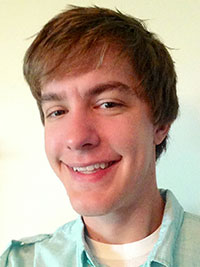News & Events
Political Science doctoral student going to India to learn Hindi
Scott Hofer awarded U.S. State Dept. Critical Languages Scholarship to study in world’s largest democracy

India’s national elections this spring took place over five weeks and in nine phases across the country to accommodate more than 814 million people eligible to vote.
Political science doctoral candidate Scott Hofer will spend this summer learning Hindi in India so he can read original documents about how governing has evolved in the world’s second most populous nation.
“Hindi is a very historic language, and India is home to the world’s largest democracy, so I thought it would be interesting to hopefully, someday be able to translate some of India’s historic, political writings,” said Hofer.
Hofer has been awarded a U.S. Department of State Critical Language Scholarship to spend two months participating in a full-immersion Hindi language institute in India.
The critical languages scholarship program is part of the National Security Language Initiative that has identified 13 foreign languages that not enough American citizens speak, read and write fluently.
Those 13 critical-need languages are Arabic, Azerbaijani, Bangla/Bengali, Chinese, Hindi, Indonesian, Japanese, Korean, Persian, Punjabi, Russian, Turkish, and Urdu.
To increase the number of Americans with the language and cultural skills to be truly fluent, the State Department sponsors fully-funded intensive language study abroad programs. Through its institutes, the program provides group-based intensive language instruction and structured cultural enrichment experiences.
Hofer had studied a bit about Asian politics as an undergraduate at Augustana College in his home state of South Dakota. He read Mahatma Gandhi’s biography, but realized his knowledge about the history and culture of India was limited. He hopes to change that this summer.
“When I leave India I hope to have gotten deeper insight into the region, India, and the culture to which the Hindi language is so closely tied,” said Hofer.
He’ll be living with a family that doesn’t speak any English. To prepare to greet them, he is working with the India Studies Program on campus to learn a few basic phrases, including ‘hello” (namastē) and ‘thank you” (dhan'yavāda,) to use immediately upon his arrival.
The UH India Studies Program in the Department of Comparative Cultural Studies offers a minor focused on the history, politics, economics, languages, religions, and cultures of India. In addition, CLASS offers courses in Hindi. This winter, the department will launch its own faculty-led India study abroad program.
As a new PhD student, Hofer hasn’t decided on what he will research for his doctoral dissertation. But he is certain that having this experience abroad will create questions in his mind that he will further explore.
“I want to learn about the nature of democracy in India and find out if it is working well,” Hofer said. “We just don’t hear too much about that here in the U.S.”
One of his professors, Dr. Jeffrey Church, assistant professor of political science, says Hofer has the capacity to take his research down whatever path he chooses.
“Scott is an excellent student whose interests range widely in political science-- from the classical political theories of Rousseau, Hegel, and Marx to contemporary policy issues surrounding inequality-- and he has the rare talent for both normative and empirical analysis,” Dr. Church said.
Hofer realizes that at the end of his two months in India he won’t be fluent in Hindi, and so does the U.S. government. The CLS program expects its scholarship recipients to continue their language studies and “later apply their critical language skills in their future professional careers.”
“Maybe I can eventually specialize in Indian political thought,” Hofer said. “So learning the language should help me out greatly.”
- By Monica Byars